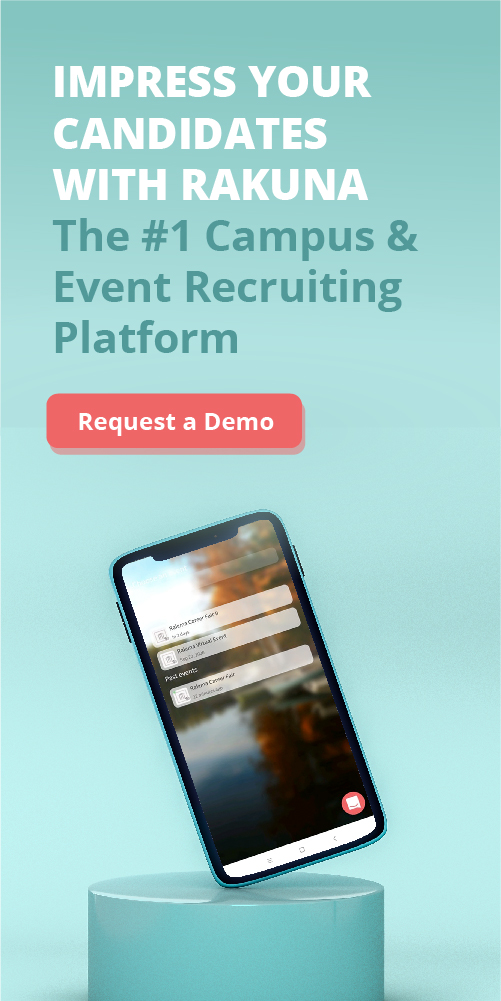Why Are College Recruitment Strategy Important?
In the 2021 Graduate Market Research, High Fliers – a renowned UK research company- revealed that 14 of the UK’s famous graduate employers offer salaries of up to £45,000 in 2021!
Today, companies are placing a higher value on recruiting students from colleges and universities. This paradigm shift is a growing trend for those in the recruitment field. As a result, it is even more important to ensure your company has a detailed college recruiting strategy.
In fact, having a college recruiting strategy is beneficial, both for prospective employees and employers. This ensures employers reap the benefits of a more diverse set of talent who have desirable skills.
Since the recruited individuals are usually more susceptible to an education-based approach while working – learning new concepts may come more easily. So, they might acquire advanced skills and face challenges. There is also an educational component that applies to employers.
Enter Gen Z
There are a few basic truths we must acknowledge in life, one being that the workforce is ever-changing. Gen Z is shaping the 2020 recruiting landscape. Demands, needs, benefits, desires, and even hiring conditions present new challenges for companies.
For this reason, adaptation to Gen Z in the workplace is vital. The great news is that students and recent graduates bring new, fresh, and objective ideas into the workplace. Yet another incentive for recruitment professionals. A new age of young professionals may, thus, shed light on ways employers can improve a workplace atmosphere.
In the end, having a college recruiting strategy in place is not only a growing trend but something that is proving vital for recruiters. If you want a foolproof strategy – it’s best to avoid these five common mistakes when creating a campus recruiting strategy.

Mistake 01: Not Having A Campus Recruiting Strategy In Place
If you don’t have a campus recruiting strategy – now’s the time to create one. Not having a well-thought-out plan can cause you to bump into hurdles while recruiting talented college students and recent grads. Before you build a campus recruiting strategy – there are a few things you should know.
Identify Target School
Start by choosing target schools, which should include the primary schools you wish to approach. The list of primary schools is where companies will spend most of their time, money, and resources. Next, it is best to create a secondary list of target schools.
Remember that each list you build should center around campuses that fit your hiring needs. Don’t forget to engage and build relationships with students and department heads. Do this early on. In fact, meeting potential candidates, even in high school, is a widely used and effective tactic that you should consider incorporating into your campus recruiting strategy.
When dealing with college students, approach them in their natural habitat. This includes on and off-campus, as well as at student centers and club meetings.
Leverage Career Centers
Career centers are great ways to reach students and access essential data to come to more sound hiring decisions. Such centers can also use data to guide students in developing critical skills that match employers’ expectations.
Close collaboration between employers and universities can help equip students with more desirable skills for employers by their expected graduation.
Mistake 02: Not Going mobile
College students are undoubtedly one of the largest groups of smartphone users. According to a recent study by Yello, 46% of Gen Z candidates have applied for a full-time job or internship on a mobile device compared to 38% of employed millennials and 26% of Gen X.
So why not make it easy for students to apply for jobs online by going mobile-first? What about going through the interview process on their own time? If you’re not doing this – you are likely already behind the curve.
💡Before you start scheduling, here are 10 critical mistakes to avoid when checking candidates’ availability for interview.
Use A Website Builder
Recruiters can achieve a perfectly optimized website by creating a clean, mobile-responsive site for your company’s job listings. Failing to do so could reduce the likelihood of students applying on your company website.
The use of website builders allows you to create branded mini-sites for upcoming campus events. These sites look professional and can be done in a matter of minutes, freeing up developers to optimize the main site. This is because you can build templates with your company branding, allowing anyone with basic skills to get a site up and running.
Self-Schedule Interviews
Scheduling an interview takes a lot of work. Working out the right slot that fits both the interviewer and candidates drains time and energy for both the recruiter and the candidate. Recruiters are addressing this challenge by turning to technology to enable self-schedule interviews. Self-scheduling feature is often a part of an interview scheduling platform. To adopt this technology, a recruiter only needs to include a self-scheduling interview link in their follow-up emails. This enables candidates to know, in real-time, the available slots in the interviewers’ calendars. No need for a rally of emails to get a booking done.
Accompanied by self-scheduling features, an interview scheduling tool often offers email automation or candidate history tracking. All of these goals will be unified: to cut time-to-interview and create an engaging experience for candidates, which will significantly benefit high-volume recruiters.
Apps and Automation
College recruiters are no strangers to the manual processing approach, which is inefficient and frustrating. To address this challenge, make custom apps and automation a part of your campus recruiting strategy.
In the old days, campus recruiters would have to show up with printed sign-in paper and have prospects note down their contact information. After each event, with the paper sign-in sheet, the team will have to (1) Decipher all the different hand-writings on the paper, (2) Manually enter those data into a computer-based format (and sometimes wonder if the transcribed information is correct), (3) Manually send emails to follow-up with students post-event. Now, that is a lot of work.
Adopting recruiting apps will open the door for recruiters to a faster and more streamlined recruiting process. With the right campus recruiting app, recruiters can get rid of the printed sign-in papers and only need to take a screenshot of the students’ resumes and for the OCR technology to parse the important information. All the paperwork is now stored in one platform that empowers recruiters to view all the necessary candidates’ information and generate a set of accurate data, communicate with candidates post-event, or send our post-event message. Not only will this help with branding and credibility, but it will drastically simplify the interview process for candidates altogether. For recruiters, this eliminates doing tedious work.

Mistake 03: Ineffective Communication Strategies With Candidates
Waiting for a three-week response to find out if you ‘got the position’ or not is too long. One could argue that it is unrealistic for a candidate to remain patient for that long. Another valid realization to arrive at is that candidates are applying to more than one company at once.
You will, therefore, need an effective communication plan in your campus recruiting strategy.
Nowadays, there are higher expectations regarding transparency and the need for instant gratification, especially among Gen Z. We can blame 24-hour news cycles and social media. The fact is – we live in a new reality. These factors all hold merit while a candidate determines where they want to work.
The recent Rakuna Student Insight Report revealed a critical insight: Communication is a key to everything. 90% of respondents prefer to use email and phone as professional communication channels and hear from the recruiter within one week after the first interaction.
In the same vein of reporting, accounting firm KPMG compiled data from 400 applicants and revealed a general sense of frustration that occurred over a lack of feedback. The accounting firm used these data points to shorten its recruitment process. In the end, this led to more satisfied applicants. KPMG’s applicants felt the process was efficient and transparent after the revamp.
It is evident that in 2020, to attract and hire the best, recruiters need a solution to manage their relationships with candidates better. A candidate relationship management system, or CRM, is what many recruiters are looking to adopt, as it can preserve all relationships over time in a single central hub. A CRM allows recruiters to manage their entire talent database smoothly and view and track the history of each and every candidate. By having an in-depth picture of a candidate, recruiters can communicate on a deeper level with more personalized and more engaging messages.
Note: Don’t Ghost Candidates
One more point of contention is ‘ghosting,’ which is never suggested. The term refers to the unexpected ending of a relationship with someone. An alarming amount of employers sever any and all communication without explaining why if they feel candidates are not fit.
It is best practice to keep recruits in the loop the entire time by sending status updates. Updates may include emails that inform candidates that someone has viewed their application or that they haven’t been selected for the role.
Being ‘ghosted’ by a potential employer hurts. Ghosting can even lead to candidates speaking not-so-favorably about your recruitment process on job review sites.
Mistake 04: Not Having An Employer Branding In Place
Branding extends well beyond traditional marketing flyers and Facebook events.
At its core, branding is about finding the most relatable and authentic way to communicate with stakeholders. This voice needs to be consistent with your company brand. As a result, you’ll want to ensure this is a part of your campus recruiting strategy.
Utilize social media
Social media has given recruiters a new avenue to connect with students on sites like LinkedIn and Facebook. Before chatting up with prospective candidates, establish a voice for your brand. Think about how to best relate to college students in their vernacular while preserving authenticity and a personal touch. The goal is to make students feel more comfortable and to personify your company.
In the case of recruitment – technology can be your friend. It is sometimes the least expensive way to engage with students, too. Your company website is where the majority of prospective candidates head first. Therefore, it should be simple and functional and contain links to your social channels. If the information is too difficult to locate, it can cause interested candidates to leave at an exponential rate. Therefore, optimization is called for in every instance.
Social media is a different beast and should also be used to promote all upcoming events. Post them to Facebook, take a photo for Instagram, Tweet if you have to – but get the information out there and make sure they are accurate.
Overall, be comprehensive in your branding and showcase everything your company offers potential recruits. Something as simple as hosting tours, shadow days, and ‘ask-a-professional days’ can work to your company’s advantage. They even do wonders to enhance the credibility of your brand.
Want to really engage with prospective recruits? Consider hosting branded parties and giving away company SWAG at events. College students love free gear. Lastly, if you have segmented mailing lists, send company news to candidates to stay on top of their minds.
While there’s no perfect employer branding formula, a comprehensive set of tools is available at your disposal. When recruiters fail to adapt to emerging technologies and trends in their college recruiting strategies, they fail to stay current. Furthermore, they fail to connect with Gen Z truly.

Mistake 05: Focusing Solely On Grade Point Average
Because the human mind varies in the way that it works, look past the grade point average (GPA). Instead, examine a candidate as a whole.
There is a chance that a candidate’s GPA is low. That doesn’t mean they are unqualified. Internships, other jobs held during college, major, volunteer experience, extracurricular activities, and relevant coursework are factors to be weighed.
You may have a candidate who is as qualified in terms of knowledge level. He or she might be a poor test-taker. Adding strict requirements for recruiters to adhere to levels the playing field for candidates. Taking such actions creates a plethora of ways for candidates to prove they are suitable for the job.
The survey had 50,000 respondents and answered a number of key questions, including:
- How successful are colleges at producing graduates who are prepared for the workplace?
- What are the majors, skills, and hiring levels of an institution’s candidates? This includes human resources, managers, and executives.
As a result of the survey, it was discovered that employers had a ‘negative association’ with online colleges. There is also a bias toward a candidate’s alma mater. These revelations alone shed light on the topic of career readiness and workplace preparation.
In order for employers to truly select the most qualified candidates, they must learn to set aside their biases. Take a step back and have an objective look at the bigger picture. In doing so, you could choose the next Steve Jobs to lead your company.
The Future Of College Recruiting
Looking ahead, college enrollment in 2020 is on track to reach an all-time high. This creates one of the largest pools of talent ever to be seen by recruiters. Don’t you want to invest time, effort, and resources in finding the best talent you will retain for over a year?
Perks like meal stipends, advanced medical insurance plans, retirement policies, time off, and remote work flexibility can help with long-term retention. The introduction of referral programs and the use of lesser-known job boards can also be introduced, along with detailed/accurate job descriptions.
Bottom Line
Not having a college or campus recruiting strategy in place is a major disservice to your company and does not allow you to showcase its full potential and capture the best next wave of talent for your company.
By neglecting the need for a college recruiting strategy, you miss the chance to act in the company’s and your recruiters’ best interest. Companies can either adapt to the fast-paced changes in the recruitment industry or become irrelevant.

